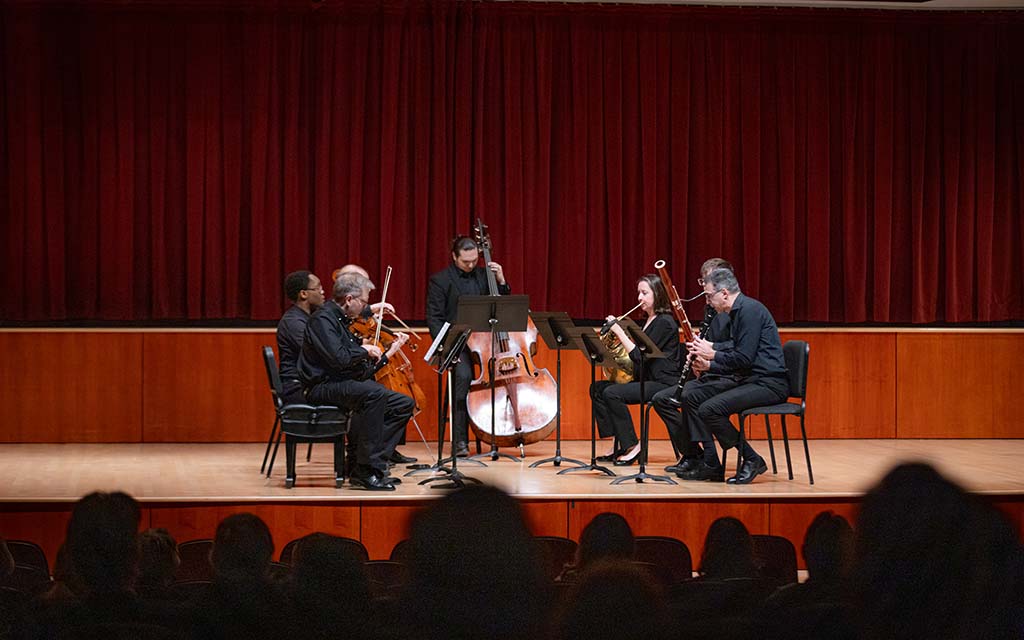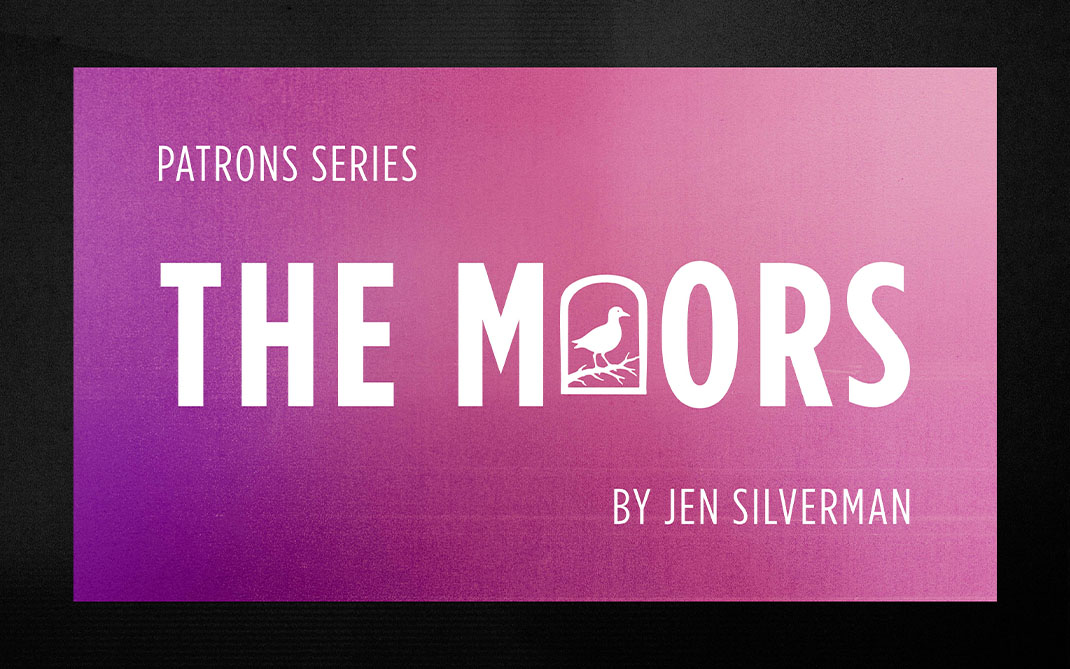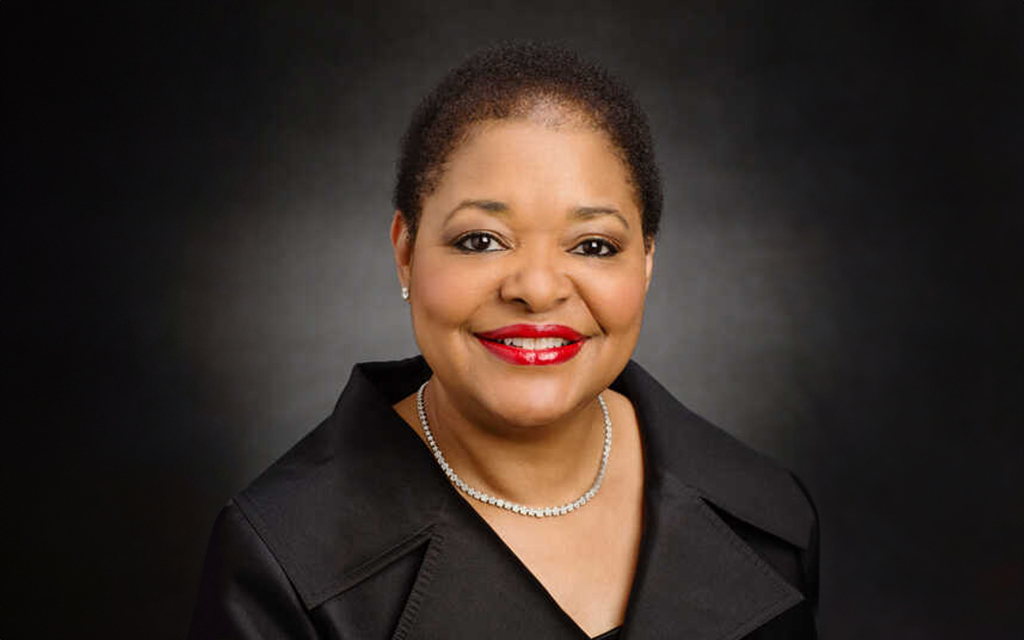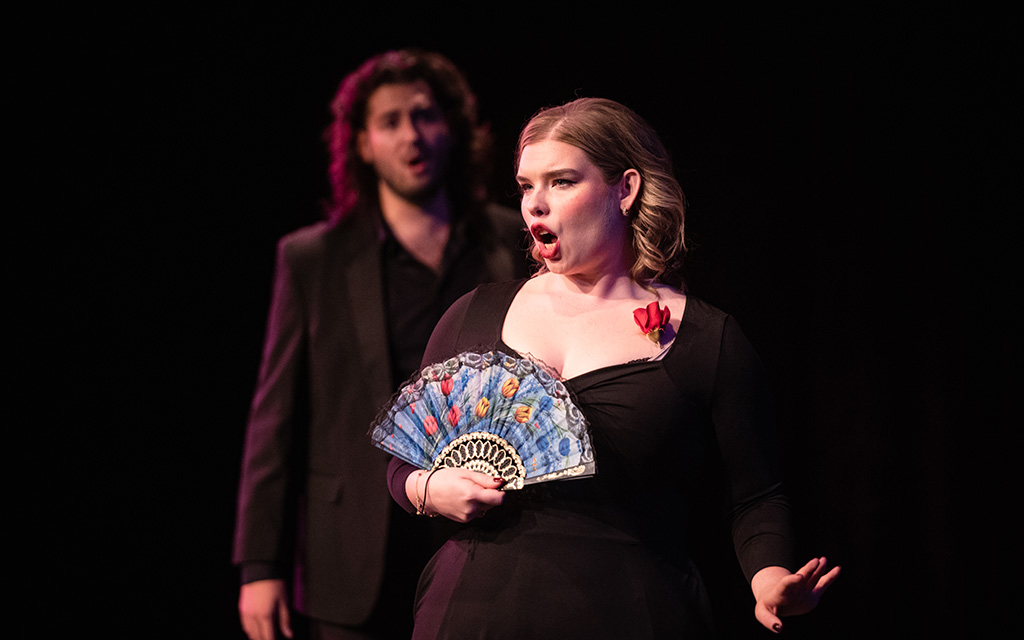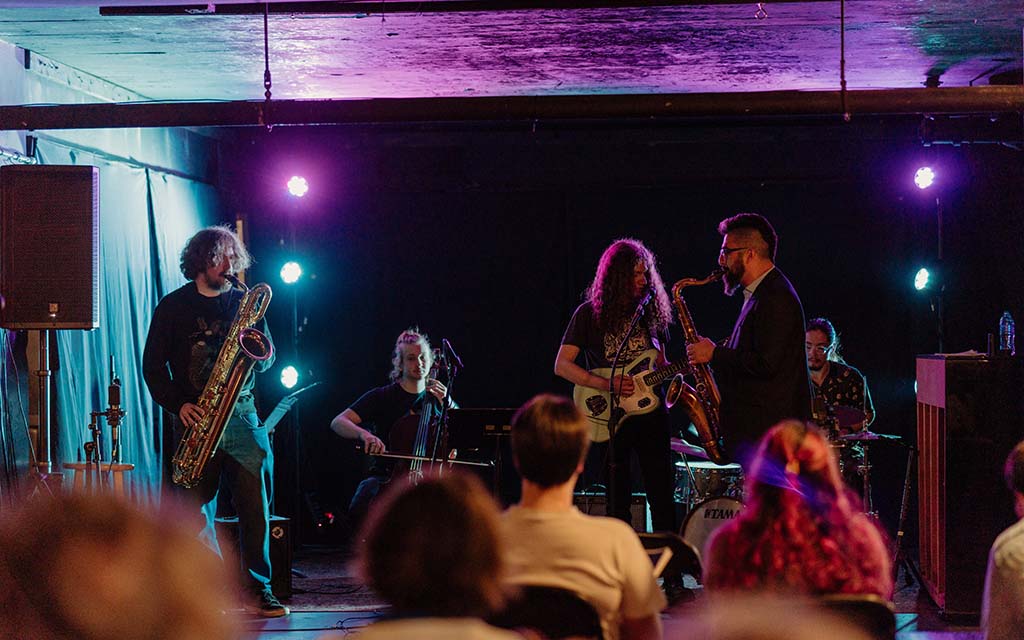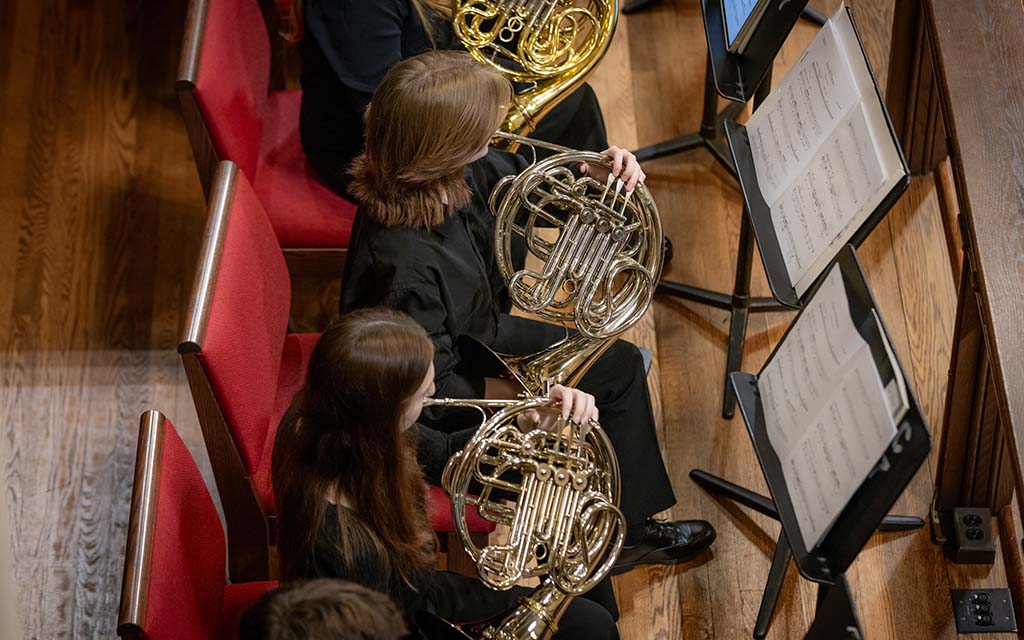Charles Andrew Gardner
The views and opinions expressed by speakers and presenters in connection with Art Restart are their own, and not an endorsement by the Thomas S. Kenan Institute for the Arts and the UNC School of the Arts. This interview has been edited for length and clarity.
Actor and educator Charles Andrew Gardner is starting his fourth term as president of the Chicago local branch of the union SAG-AFTRA.
He grew up in Chicago and studied acting at Northern Illinois University. He is a company member with TimeLine Theater and has acted on several of Chicago’s important stages. He has appeared on the Chicago-filmed TV shows “The Chi” and “Chicago P.D.,” and his film credits include “Long Ride Home” and “Olympia.” He has also shot several national commercials for brands including Hyundai and Liberty Mutual, and he has many credits as a voiceover artist.
This interview took place a little over five weeks after SAG-AFTRA, having failed to reach an agreement with AMPTP (the Alliance of Motion Picture and Television Producers), went on strike on July 14, 2023. At the core of the disagreement between the actors and the producers is the amount of residuals actors should receive for streamed content. Also on the negotiating table are the burdens on actors of self-taped auditions, the amount producers should contribute to the union’s healthcare and pension funds and how the use of AI-generated likenesses of performers should be regulated.
Here Charles explains why he chose to remain in his hometown as he set out on his acting career and how a passion for education continues to inform his leadership style as he shepherds his fellow union members through this latest challenge.
Choose a question below to begin exploring the interview:
- What made you want to base your artistic career in Chicago after having grown up and gone to school there?
- What went into your decision to become head of the Chicago local branch of SAG-AFTRA?
- Can you talk about some of the innovations you were planning to put in place?
- What are you hearing from your fellow members about these initiatives?
- What it was like in the days leading up to the decision to strike. What did that feel like? How did you communicate to your membership?
- What might the average person not understand about what’s at stake? And what personally is at stake for you?
- How are you and your fellow strikers holding up? What’s it like on the lines?
- I’m sure in your classes there’s a few students who have expressed an interest in doing this work professionally. What do you tell them now in 2023 that you might not have heard when you yourself were a student?
Pier Carlo Talenti: What made you want to base your artistic career in Chicago after having grown up and gone to school there?
Charles: When I came back from school, I really started to explore what success truly looked like outside of being able to be a successful actor. What else was important to me? I started teaching as a substitute teacher, and then shortly after, [he chuckles] I realized I wasn’t cut out to be a substitute teacher. My heart goes out to all substitute teachers. But I knew that I wanted to be a teaching artist and grow my education and leadership facets of myself. I thought that if I moved to L.A. or if I moved to New York, that actor switch would turn on and the blinders would go on, and I would ignore everything else to pound the pavement and really make it as an actor.
Chicago offered me the space to grow as an actor as well as an educator and a leader. That really made Chicago stand out to me. I’m also, like I said, from Chicago, so my family’s here, my community’s here. I am one of those seasonal people, so I love seasons. I love everything about the community of Chicago. It just really felt like the perfect fit.
Pier Carlo: You mentioned that one of the reasons you wanted to stay in Chicago was not only to pursue your art but also both your teaching practice and your leadership, so I want to talk about your decision to become head of the Chicago local branch of SAG-AFTRA. What went into that decision?
Charles: It started with a good friend of mine, Troy Pryor. We’ve known each other almost about 15 years now. We were both voiceover actors at a talent agency in town. He reached out to me, and he said, “Hey, Charles, I’m on the board right now of SAG-AFTRA, and I think it might be a good idea for you to join. I think that they could use your voice. I think they could use your talents and your leadership.”
I joined SAG-AFTRA in 2012, let me say that, just right after the merger, and in 2015 I ran for the board and I got elected. I’ve always been the person that when I belong to something, I truly want to belong to it. So while I was sitting on the board, I knew that he was right, that they could use my leadership, they could use my innovation, they could use my creativity. So the next year, the next term, in 2017, I decided to run for the president.
I put together a whole package of ideas of things that I wanted to see happen in the local: education, empowerment and professional development. I approached the then-current president, and I literally just asked him, “Hey, I’ve got a bunch of ideas, I’ve got a bunch of energy, and I’m ready to put in the work. Would you be willing to step down so that way we can run uncontested?”
Chicago has a very long history of uncontested elections. It’s a very just one-voice type of a town. There’s not a lot of politics in our SAG-AFTRA leadership. When that happened, he said, “Well, if I’m going to step down, what’s the plan?” And because I was already ready, because I had already prepped, I just laid out a lot of the things that I wanted to get done. And as of this past year, I just ran uncontested, and I’m going into my fourth term as the current president.
Pier Carlo: Wow, congratulations. Can you talk about some of those innovations you were planning to put in place?
Charles: Yeah, yeah. Like I said, I’m an educator, and I’ve always known that for myself, the more education that I have, the more readiness that I have in my own craft, the more I can allow myself to be present and in the moment. I wanted to bring a lot of that education right to the union, because if producers are going to be using Chicago talent, I wanted them to be the best, not only from the producers’ perspectives but also from our own perspectives. I wanted my members to know that when they stepped on set, when they stepped in front of their self-tape setup for an audition, they had confidence in their ability.
I wanted to bring a lot of that education right to the union, because if producers are going to be using Chicago talent, I wanted them to be the best, not only from the producers’ perspectives but also from our own perspectives.
One of the things that we initiated very early on was On-Cam Jams and Voiceover Jams. Those were basically opportunities for members to pick a side, a piece of audition copy, and work on it and then come together as union members and sharpen each other. I put my audition on tape, and then we watch it back with the group of 15, 20 people. We give each other feedback. We try it again. That way, when we do get those auditions, when we do walk on set, it’s not the first time. We’re not warming up, but we are enacting the practice that we’ve already put in place. Just building that skill, that muscle, in a controlled environment.
Some other workshops that we’ve built were around the same thing, just around getting us opportunities to audition, giving us opportunities to work on our craft. We also initiated Wake-Up Wednesdays, which is a fellowship and a community-building opportunity where literally we just wake up, we stop in the office — during the pandemic, we pivoted to virtual, and now we’re back in person — and we just get together, have a cup of coffee and talk about what’s on our minds or talk about what’s going on or if there’s any industry updates. We just sit around with some coffee and chop it up or chat it up.
Pier Carlo: And what are you hearing from your fellow members about these initiatives?
Charles: They love them. They love them. The opportunity for continued community-building outside of the audition room, outside of rehearsal, is needed. I think that the strike has showed us that, right? A union united will never be divided, and that starts before we hit the picket lines. It starts before we hit the rallies. It starts with our own internal organizing so that way members know that the union is more than just protections and advocacy, which it is, but it’s also family. It’s also a group of people that are doing exactly what you want to do, what you are doing. Sometimes, especially with self-tapes, you can feel like you’re on your own, and so just to have that community, it feels really, really good.
Pier Carlo: It’s so collegial! Often we think of acting as being so hyper-competitive because you’re going after the same roles and the audition room is not collegial. I love that you’re making opportunities for everyone to learn from one another.
Charles: Yeah, and to really drive home the idea that we’re not in competition with each other. A lot of that for the actor comes from a scarcity mindset. It comes from, “If I don’t get this audition and somebody else does, then either I’m not a good actor or they’re a better actor. Or maybe I should give up. Maybe those voices in my head, maybe the voices from my loved ones that I should have a plan B or I should give up or I should pivot and do something different, maybe those voices were right.”
I want to try to do away with that scarcity mindset as much as I can, as best I can, and really invite myself and also any other actors that listen to me or that I get a chance to talk to into an abundance mindset. There’s more than enough opportunity in Chicago and North Carolina and Atlanta and New York and L.A.; there’s more than enough. And if I don’t book this job, then as long as I’m doing my job and preparing and being the best actor that I can be, I’m planting seeds for tomorrow’s opportunity and for next week’s opportunity and for next month’s and next year’s opportunity. And just having patience and having faith that I know that I chose to be an actor for a reason, and at some point it will come to fruition. So that’s really what a lot of that conversation and community-building is all about, getting away from the competitiveness and the out-for-self-ness of the business and really just building it all together so that way when one of us wins, we all win.
Pier Carlo: I’d love to hear from you what it was like in the days leading up to the decision to strike. What did that feel like? How did you communicate to your membership?
Charles: It was a lot of uncertainty. It was a lot of hopefulness, a lot of lack of hope with the entertainment industry. There was a lot of confusion, members not knowing what information sources to listen to. A little bit of a fear. A big joint strike like this hasn’t happened in almost 60 years, and so it’s just uncertain times, especially coming out of a pandemic. We had just started to get our feet back underneath us, and then this felt like a second blow. And to be out of this category of work, especially when Chicago a couple of years ago started out with one or two shows a year and now we’re up to 13 to 17 shows, for all of that to go on strike, it feels like, will it come back?
A lot of my job, my responsibility as a leader, is everything that we’ve talked about so far: to listen, to synthesize and to springboard forward. But it’s also to give hope. And it’s also to share the idea of resilience and of just, “It will work.” I have a very high level of faith in the idea that if I decided to be an actor, it was for a reason. If I decided to join SAG-AFTRA, it was for a reason. All of those reasons are still here, whether or not we’re on strike, whether or not it’s a pandemic. Me being able to share that perspective and potentially and hopefully shift other people’s perspective to have more patience, to have more faith in the industry and have more faith in the whole process of the thing, that’s really what I was trying to do at the beginning of the strike, leading up to it.
I sent out a couple of email letters to members, letting them know that the union is here to support them, that we may go on strike, and if we do, just know that we are going to come out on the other end of it stronger and more unified in the industry and also within ourselves, within the union.
Pier Carlo: What might the average person who’s reading about the strike from a newspaper not understand about what’s at stake? And what personally is at stake personally for you?
Charles: Two main things. I’ll kind of take a tangent first and then I’ll answer more directly your question. I think the average reader, the average American — I like to call them Muggles —
Pier Carlo: The non-show-biz folk?
Charles: [He laughs.] The non-show biz folk. The average person, when they think about SAG-AFTRA, think about the high pros. They think about the celebrities. Our negotiating partners, the AMPTP, kind of says, “They can afford it. The actors, they got it. They’re OK financially.” That’s what the average person thinks about, at least in my findings when I’m talking to people. They think about the celebrities, the people who are rich or wealthy, but what they don’t think about is the fact that SAG-AFTRA actually belongs to the AFL-CIO, which is a labor organization. We’re a labor union; we’re laborers.
We’re a labor union; we’re laborers. Actors are a lot like plumbers or electricians or carpenters, where we practice our trade, we get really good at our trade, but at the end of the day, we are still looking for opportunities on a day-to-day basis.
Actors are a lot like plumbers or electricians or carpenters, where we practice our trade, we get really good at our trade, but at the end of the day, we are still looking for opportunities on a day-to-day basis. We are still hoping to string together enough bookings so that way we can pay our mortgage or we can pay our rent so we can keep our lights on and we can keep food on the table. We can hopefully, if we have children, afford them a greater educational opportunity and provide for them and provide for the rest of our family. So that’s, I think, the one first misconception.
Then what I’m hoping to get out of this strike is a brighter future, not just for myself but for all of the students that I teach and for all of the students who I haven’t even had a chance to teach yet. When I was coming up, I didn’t know about SAG-AFTRA. I didn’t. I grew up pretty poor on the South Side, and my mom did everything that she could to support me in my career. She put me in classes at a very early age. At 9 years old, I started acting at acting camp, which was also a community theater on the South Side called eta. I was learning all about confidence and stage presence and truly leadership, but I wasn’t learning about unionism. I wasn’t learning about this organization that I could join that would put consistent food on my table and that would give me access to healthcare and that would give me a pension. I wasn’t learning about that.
And so what I’m hoping we get out of this strike is the same thing that came out of the last strike. The last strike in the ’80s, that’s when we actually got our current health plan. That’s when we got a large part of our current residual structure. That’s when a large addition to our pension plan came into play. And so I’m hoping that this strike gives us the foundation to move forward for the next 20, 30, 40, 50 years.
Now, I hope that we don’t have to go on strike again because I hope that this also shows the industry and the general public — and, I think, specifically the AMPTP — how strong and united SAG-AFTRA is. I hope we don’t have to go on strike again, but I hope that they know that if we need to, we will. And I hope that, like I said a little while ago, we get all of the residual structures from streamers that we’re asking for in negotiations. I say they, because we have a negotiating team that does all of the negotiating for us.
Pier Carlo: Right. Because during the last strike, we couldn’t even imagine the thought of streaming. It’s entirely new.
Charles: Right, it’s entirely new. But it was a similar concept, though. “Oh yeah, this cable thing. We don’t know if cable’s going to stick around. Oh yeah, this VHS thing. We don’t know if that’s going to stick around.” So it’s always the same thing. It’s them, the industry, already knowing that something’s going to work or having an idea that something’s going to work and then just saying that it won’t or pretending that it won’t, which leaves actors catching up to the industry, catching up to the financial gains, the financial benefits that the top percent, the AMPTP, the CEOs of those big companies, are raking in, leaving us to hopefully qualify for health insurance or hopefully make enough to pay our mortgages or our rents.
So I’m hoping that that’s what we get from this, a brighter future where the industry is still balanced and it is financially viable to be an actor, to be an entertainer.
Pier Carlo: How are you and your fellow strikers holding up? What’s it like on the lines?
Charles: It’s tough, but it’s joyful and it’s full of solidarity. I say tough because this is one of our main contracts. And let me clarify that we’re not on complete strike, right? This is not an industry-wide shutdown. These are only the TV theatrical contracts that we negotiate with the AMPTP. There are still commercials being filmed and recorded. There are still some voiceover things happening, if it’s not for television. There are still some animation things. There’s still some TV and there’s still some film things still happening.
There's what’s called an interim agreement, which is the union recognizing that not everybody should be lumped into that one category. So if you adhere to the current agreement that we are negotiating for, then you can get the greenlight from the union to move forward with your productions. But if we’re on strike against your production company or that studio, then that work is the work that has come to a halt. So that makes it tough. And uncertainty is tough.
Our industry is already uncertain for the actor, right? I get an audition, I pour my heart, my soul, all of my creativity into this role for a couple of days, and then I’ve crossed my fingers and I hope that the stars will align and I’ll get that part. That’s uncertainty, and that’s tough. But to say we don’t even know when we’re going to come back to the table, especially when you have people out in Hollywood trimming trees so that way strikers don’t have shade … . We have people out in Hollywood saying, “We’re going to wait out the writers until they lose their homes, until they’re out on the streets and they’ll take any deal.” It’s terrible. It’s not bargaining or negotiating in good faith, and it’s not a unified front. It feels tough to witness that side of the industry.
The other side of it, though, that joy and that solidarity, is the fact that at least here in Chicago — and from what I can tell on calls with other national leaders and from all of the social media and media coverage that we’re getting — our strike lines are not waning. Our solidarity is growing in numbers, and it’s joyful to see that so many people support us, not only just union members, SAG-AFTRA members, but also other labor unions.
And also general Muggles, non-industry folk. Everyone that I talk to says, “Hey, why are y’all striking? I get it, I support you, but I want to understand.” They really want to understand our plight right now. And so that feels joyful, to know that we will come out on the other side victorious, to know that we will come out in a glorious win. That gives me hope. And to see everyone’s face as we continue to rally and to picket and to strike, that gives me joy as well. To continue to build community.
I’ve seen more members over the past couple of weeks than I have in the last couple of years. I say to my members constantly, “Just stay joyful, stay building solidarity because it will come to pass.” And anybody that’s listening to this, I say the same thing. Just keep believing that it will turn out for our good because it will. The strike won’t last forever.
I sat on a panel yesterday, speaking of Troy Pryor, at the XL Film Festival out on the South Side of Chicago. It’s his second annual film festival, specifically uplifting black creatives. I said on the panel that during this strike, get out on the picket lines, get out on the rally lines, but also stay still for a second. Actors have this thing about being booked and busy. I know I had it a lot in the beginning of my career. And in times like this and times like the pandemic, we were forced to stay still for a second. In that stillness, while we wait, there’s an opportunity, of course, there’s an opportunity to be downtrodden, there’s an opportunity to be lose hope or to be frustrated, but there’s also an opportunity to look inward and to see what you truly want success-wise, what you truly want your career to look like, what you truly want your habits and your hobbies to look like, where your passion truly lies. In finding those things, you find a fire, you find a light that can’t be extinguished, regardless of pandemic, strike, being out of work, waiting on work, or working. It is that kind of guiding voice, that guiding light for yourself that truly gives you happiness and truly gives you your own authentic idea of success.
Pier Carlo: You are about to head into a new school year at DePaul, if it hasn’t started already. I’m sure in your classes there’s a few students who have expressed an interest in doing this work professionally. What do you tell them now in 2023 that you might not have heard when you yourself were a student?
Charles: That’s a great question. [He laughs.] I got to give props to my professors. They set me up pretty well. A lot of what I believe to be true about acting I received while I was at Northern. A lot of what I believe to be true about what I was just speaking on a second ago of just being still and finding your passion and your own idea of success, those seeds were planted while I was at Northern.
Well, actually, I’ve got to go back even further before then for that idea of that internal compass. That came from while I was at eta, from one of my movement instructors, Mama Jeri. We were doing Katherine Dunham Dance Technique, which is a combination of Afro Caribbean dance movement and music, and we would be doing this floor progression, walking down the dance floor with our shoulders down and back and our chest up and out, our chin up and out. And Mama Jeri, this amazingly powerful Afrocentric, buzz-cut — and I’m talking about buzz-cut in the ’90s, so it wasn’t a fad yet; it was just an expression of self — she would say to us, “I don’t care if you go on to be an actor, an artist, an architect or an astronaut. You’re going to be able to walk into any room with your head held high, and they’re going to know that you belong.” So as 9-year-old Charles with a group of other young Black kids, that was the original seed. When I got to Northern, it was definitely cultivated. It was definitely added to.
So I would say the same things that all of the shoulders that I stand on poured into me: to find yourself first. I call it the stank. Find your own stank, right? Find your own authentic voice. That’s what I try to pour in, because audition after audition — yes, maybe a no, maybe a bunch of nos — the one thing that remains is you, your experience, your perspective, and truly your voice that you give to every single audition, that you give to every single role. That’s the magic, right? Technique, yeah, sure, great. We’ll learn all of that. Creativity, yeah, sure, we’ll amplify that. But if you are constantly trying to speak as someone else, if you’re constantly trying to become the character but not necessarily thinking about what parts of myself are present in that character, you’re pretending and not in a good way the entire time.
I think that a lot of problems come along with that: constantly searching and hoping that you find happiness, constantly searching and hoping that you find success, imposter syndrome, because you don’t know who you are so when you get somewhere, you may have the success, but you don’t know why specifically you got that success. So finding that out early on I think is imperative.
And I think another thing that I would say to my young students is to have fun. [He laughs.] Just have fun, y’all. We get to, the good pretend, we get to play pretend for our lives. We get to play pretend for our passions and for our careers. I got a lot of flak from a lot of my fraternity brothers. I pledged Alpha Phi Alpha Fraternity Incorporated in college, and I would get a lot of flak from them. They were like, “Oh, Chuck, you’re going to play make-believe?” And I was like, “Yes, I am. Yes, I am.” But now, I look at a lot of them, and they are picking up art now. Fifteen years out of school, they’re picking up art. They are making career pivots because they were following the idea of a job. They were following an idea of making some money, but they weren’t following what made their soul happy. They weren’t following what made their heart sing. So I would say have fun and follow that right from the beginning.
September 06, 2023
